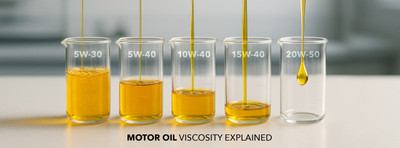
Motor Oil Viscosity Explained
Understanding motor oil viscosity is one of the most important steps in maintaining your engine’s health and efficiency. Viscosity determines how easily the oil flows in your engine, especially in different temperatures and conditions. Whether you drive in cold winters or hot summers, choosing the right viscosity can make the difference between smooth performance and costly wear.
What is the viscosity of motor oil?
Viscosity refers to the thickness or resistance to flow of a liquid. In the case of motor oil, it measures how easily the oil moves through your engine’s components. A low-viscosity oil flows faster, providing easier lubrication in cold starts, while a high-viscosity oil maintains its thickness at higher temperatures, offering better protection under stress or heat.
What do the numbers on oil viscosity mean?
When you see oil labeled as 5W-30, each part of that code provides valuable information:
- The first number (before the W) indicates how the oil behaves in cold temperatures. The “W” stands for Winter, so 5W means the oil flows easily even in low temperatures, improving cold starts.
- The second number (after the W) represents how thick the oil remains at normal engine operating temperatures. A 30 grade oil is thicker and offers more protection in heat compared to a 20 grade oil.
For example:
- 5W-20 flows faster in cold conditions and is great for newer engines focused on fuel efficiency.
- 10W-40 stays thicker at high temperatures, making it ideal for older engines or hot climates.
Motor oil viscosity chart
The following chart summarizes the most common viscosity grades and the conditions they’re best suited for. This quick guide can help you choose the right oil for your driving needs.
0W-20 motor oil
0W-20 motor oil is an ultra-low-viscosity lubricant designed for modern engines that demand excellent fuel efficiency and cold-start protection. Its “0W” rating ensures quick flow in freezing conditions, while the “20” maintains optimal thickness at operating temperature. Ideal for newer vehicles and hybrids, it reduces engine wear and emissions while improving mileage and performance in cold climates.
5W-30 motor oil
5W-30 motor oil is one of the most versatile and widely used grades, offering smooth startups in winter and reliable film strength in hot conditions. It provides excellent protection, stability, and fuel efficiency for a wide range of gasoline engines, from compact cars to light trucks, making it ideal for year-round driving in varying climates.
10W-40 motor oil
10W-40 motor oil is a thicker, high-temperature lubricant suited for engines operating under heavy loads or in warm environments. It maintains stable viscosity under stress and helps reduce oil consumption, making it an excellent choice for older vehicles, motorcycles, or performance engines that need extra protection against heat and wear.
10W-30 motor oil
10W-30 motor oil offers balanced protection for both moderate and warm climates, ensuring reliable lubrication and reduced friction. It’s recommended for cars, trucks, and small equipment, providing durability and clean operation in engines that need steady viscosity under normal and high-temperature conditions.
15W-40 motor oil
15W-40 motor oil is a heavy-duty lubricant engineered for diesel and gasoline engines that operate under high stress or extreme heat. Its thicker oil film provides superior wear protection, oxidation resistance, and soot control, making it the go-to choice for trucks, agricultural, and construction machinery in hot weather.
20W-50 motor oil
20W-50 motor oil is a high-viscosity blend formulated for older or high-performance engines that run hotter or have higher mileage. It helps maintain oil pressure, reduces consumption, and forms a durable film under heavy loads, ideal for classic cars, motorcycles, and vehicles used in hot climates.
25W-60 motor oil
25W-60 motor oil is designed for racing engines, high-compression systems, and older vehicles exposed to extreme heat or stress. Its high viscosity provides exceptional film strength, reduces oil burning, and maintains stability at very high temperatures, ensuring long-lasting protection and performance in demanding conditions.
Not sure if it’s time to change your oil? Our motor oil color chart helps you identify oil condition just by checking its color and consistency.
|
Type |
Viscosity |
Best for |
|
0W-20 Motor Oil |
Very low |
Excellent for cold climates, newer engines, and improved fuel economy. |
|
5W-30 Motor Oil |
Low to medium |
Versatile for year-round use; ideal for modern cars and balanced performance. |
|
10W-40 Motor Oil |
Medium to high |
Great for warmer climates or engines with moderate wear. |
|
10W-30 Motor Oil |
Medium |
Suitable for mild to warm weather and everyday driving. |
|
15W-40 Motor Oil |
High |
Common for diesel or heavy-duty engines in hot conditions. |
|
20W-50 Motor Oil |
Very high |
Best for older, high-mileage engines or extreme heat. |
|
25W-60 Motor Oil |
Ultra high |
Typically used in racing or heavy-load applications requiring maximum protection. |
How to choose the right viscosity motor oil?
When selecting the proper oil viscosity, consider the following factors:
- Climate: Cold environments require thinner oils (like 0W-20), while hot climates benefit from thicker ones (like 15W-40 or 20W-50).
- Engine type: High-performance and diesel engines often need higher viscosity oils to handle heat and pressure.
- Mileage: Older engines with wear often perform better with thicker oils that reduce leaks and maintain pressure.
- Manufacturer recommendations: Always check your vehicle’s owner manual, manufacturers specify the ideal oil for performance and protection.
- Driving conditions: Frequent short trips or stop-and-go driving might need oils that handle temperature fluctuations and deposits well.
If you’re looking for reliable performance and protection without breaking the bank, check out our guide on the best conventional motor oil to keep your engine running smoothly.
Can you mix motor viscosities?
While it’s technically possible to mix different viscosities (like 5W-30 with 10W-30), it’s not recommended. Mixing can alter the oil’s flow characteristics, reducing performance and protection. Always use the viscosity grade recommended for your vehicle. Some drivers mix synthetic and conventional motor oil to balance cost and performance.
Which engine oil viscosity is best?
There’s no single “best” viscosity for all engines. The right choice depends on your vehicle, the climate, and your driving habits. A compact car in a cold region might thrive on 0W-20, while a heavy-duty truck in hot weather needs 15W-40. The goal is to maintain consistent lubrication under your typical driving conditions.
Curious about how long motor oil lasts before it needs replacement? We break down the factors that determine oil longevity and effectiveness.
What happens if oil viscosity is too high?
Using an oil that’s too thick can cause several issues:
- Harder cold starts
- Reduced oil flow to critical parts
- Increased engine drag and lower fuel economy
- Potential overheating under high load
Regular maintenance is essential, learn when to change your motor oil to extend your engine’s life and improve performance.
In short, too much viscosity doesn’t mean better protection, it can actually reduce efficiency and accelerate wear.
